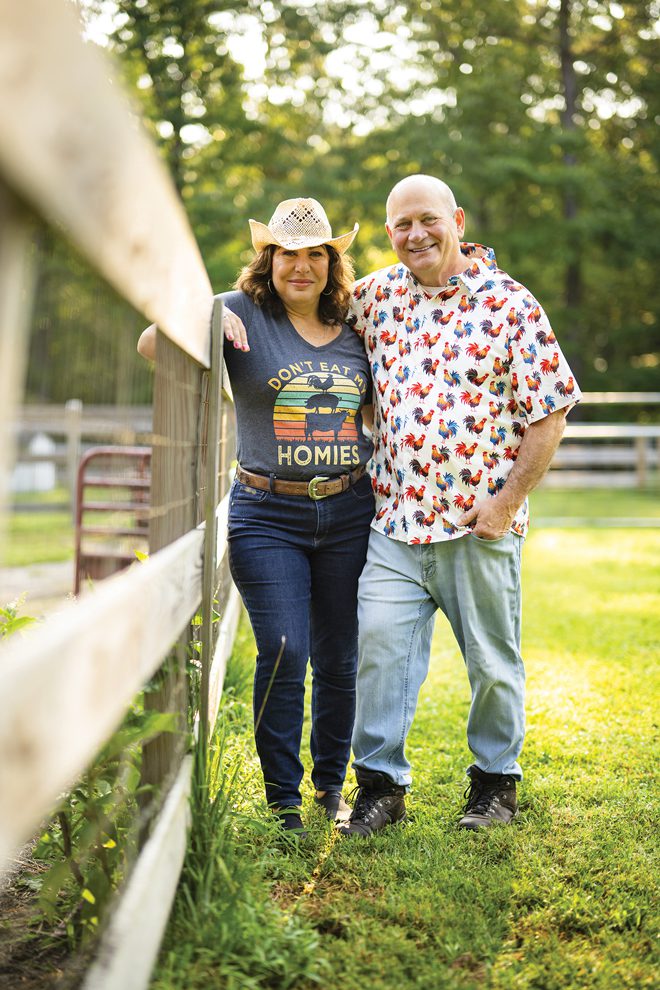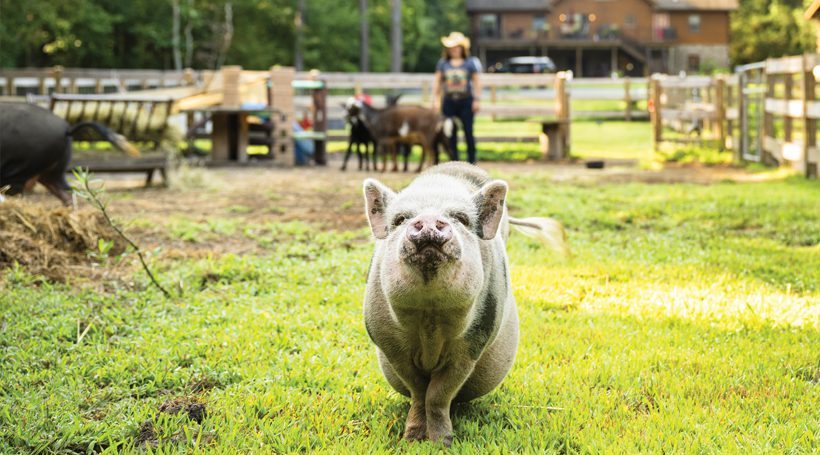Photography by David Michael Howarth
Life wasn’t always like this for Krista & Jeff Nash. In fact, the Camden County Commissioner (that’s Jeff) and the Vice Chair of the state’s cannabis regulatory commission (that’s Krista) never could have imagined they would move, in their late 50s, to a farm with 27 – and counting – rescued animals. Well maybe Krista could have. She’s had a passion for animals as long as she can remember. But today, they both share that passion, as well as a commitment for helping their communities. So you could say life is good for the Nashes, especially on the farm.

Krista Nash was only 9 when she discovered her cause. It wasn’t boy bands or bubblegum pop that won her heart, but a small ad hidden in the back of “Tiger Beat,” the teen celebrity magazine of the ’70s and ’80s. For $4.80, she could help save a kitten through the North Shore Animal League, a national animal rescue and adoption organization.
She gathered coins, sealed them in an envelope, and mailed it. That was her first animal rescue. It wouldn’t be her last.
Today, Krista and her husband, Jeff, care for some 27 rescued animals on a 3.5-acre farm in Winslow Township – all while balancing high-profile roles in public service.
Jeff, 66, is Camden County’s longest-serving commissioner and a staunch advocate for environmental preservation and open space. He holds multiple roles: CEO of the Rowan University/Rutgers-Camden Joint Board, Vice Chair of the Delaware River Port Authority, a partner at the law firm Nash Perez in Camden, and a board member with a legal clinic.
Krista, 60, a licensed clinical social worker, is a commissioner with the New Jersey Cannabis Regulatory Commission, appointed for her expertise in addiction, mental health and social work.
 Up with the roosters in the pre-dawn hours, the couple tackles the morning feeding routine before heading off to meetings in Camden and Trenton.
Up with the roosters in the pre-dawn hours, the couple tackles the morning feeding routine before heading off to meetings in Camden and Trenton.
“It’s early mornings, hard labor, and a lot of feed bills,” Jeff says. “When the donkeys come over and nuzzle you or you see a rescued animal thriving, there’s nothing better.”
The idea of moving from their longtime home in Cherry Hill to a farm started with the couple’s cats – 11 of them, many rescued and fixed through Krista’s trap-neuter-never-release mission. In the more densely populated suburbia, their expanding feline family began to raise some eyebrows.
“Let’s be honest. We moved to the farm for the cats,” Jeff says, only half joking.
 Although animal rescue wasn’t originally Jeff’s dream, his deep connection to the land pulled him in. As a county commissioner, he’s spent decades preserving open space and expanding the Camden County park system. That work gave him a front-row seat to the power of green space, not just for the public, but eventually, for his own life.
Although animal rescue wasn’t originally Jeff’s dream, his deep connection to the land pulled him in. As a county commissioner, he’s spent decades preserving open space and expanding the Camden County park system. That work gave him a front-row seat to the power of green space, not just for the public, but eventually, for his own life.
“I grew up in a Brooklyn rowhouse,” he says. “Now I’m out here with goats and chickens. And I love it.”
The couple met later in life and have been together for 18 years, blending families and ultimately creating what became Gem Lane Farm in 2019 – a name that nods to both of their middle names.
Once the idea became real, they knew the location had to be in Camden County, Jeff’s longtime home base in government.
“It really was a leap of faith,” Jeff says. “I credit Krista for doing the groundwork and figuring out what we needed. We had no preconceived notion of what animals to get. We just knew we were partial to rescues. It was blind faith in moving this dream forward.”
When they moved in, the house sat on 3.5 wooded acres, but there wasn’t a farm yet.
They hired an Amish crew to build it, then slowly fenced in paddocks and animal areas as time and budget allowed.
 They started with chickens. Then came the donkeys, rescued from a North Jersey sanctuary. Next were goats (3 Nigerian dwarfs) and finally, pigs, who had been abandoned and brought to a South Jersey rescue. While the official rescue count is 27, their open-door policy seems to have extended to a few surprise guests.
They started with chickens. Then came the donkeys, rescued from a North Jersey sanctuary. Next were goats (3 Nigerian dwarfs) and finally, pigs, who had been abandoned and brought to a South Jersey rescue. While the official rescue count is 27, their open-door policy seems to have extended to a few surprise guests.
“The ring camera recently caught Krista feeding hot dogs to the turkey vultures on the deck,” he says. “I was wondering why there’s all this bird poop on our deck, until the ring camera outed her. So we’re also taking care of two turkey vultures, a fox and apparently, a new raccoon.”
“Everyone eats something different,” says Jeff, who starts working on the farm at 5:30 am every day. “The pigs get fresh produce and grain, the donkeys love carrots and hay.”
He puts to rest the notion that backyard chickens are a money-saver.
“People say, with the price of eggs, you must be saving a lot having your own chickens,” he says. “These are the best-fed chickens in America, and it costs us. It’s like $100 a dozen.”
At least their waste is also put to good use. The Nashes compost manure into what they call “black gold” for their garden. On Sunday mornings, Jeff can often be found outside cleaning stalls and turning compost piles, no matter the weather.
Balancing the property, the farm, the animals and their full-time jobs is intense, Krista says. “If anything upsets the balance, it’s a challenge. We’re a team, and we have a routine. If something breaks that rhythm, things can fall apart quickly.
And there are no days off.
“Even when we travel, which is rare, we have to make sure our friend Sherry can stay here and take over,” Krista says.
Sherry Rosenblum, a close friend and fellow animal lover, stops by several times a week to help. “The animals love her,” Krista adds. “She came back from vacation and went straight to the barn to see the donkeys before even unpacking.”
That kind of support matters, especially when life throws curveballs. Krista recently had a hip replacement, which made it tough to carry feed or walk long distances on the property. A year earlier, Jeff was the one out after having rotator cuff surgery.
“We take turns being the weak link,” Krista adds. “But we always figure it out.”
Even the weather is a factor. Extreme heat and bitter cold both impact the animals.

“When the water lines freeze in winter, we’re out there early in the morning, chipping ice and trying to melt it so the animals can drink,” Krista says. “In this summer’s heat, we had to order giant fans for the chickens and pigs. I was on Amazon and Tractor Supply, getting what we needed as fast as possible.”
Pigs, she adds, don’t sweat, which makes them especially vulnerable. “I didn’t know that at first. But we’ve learned as we go.”
On the farm, their grandkids (ages 7 and 2) have taken to animal care with joy. Their adult children? Not so much. “They’re city dwellers,” Krista says.
It’s not the empty-nester plan most people picture: chasing pigs, composting manure and chipping ice off pipes to beat the freeze, all before heading to a meeting in Trenton.
“I knew it the first time I saw the house,” Krista says. “This is where I want to be.”
Five years later, surrounded by braying donkeys, clucking chickens, sunbathing pigs, and now turkey vultures, that feeling hasn’t changed.















